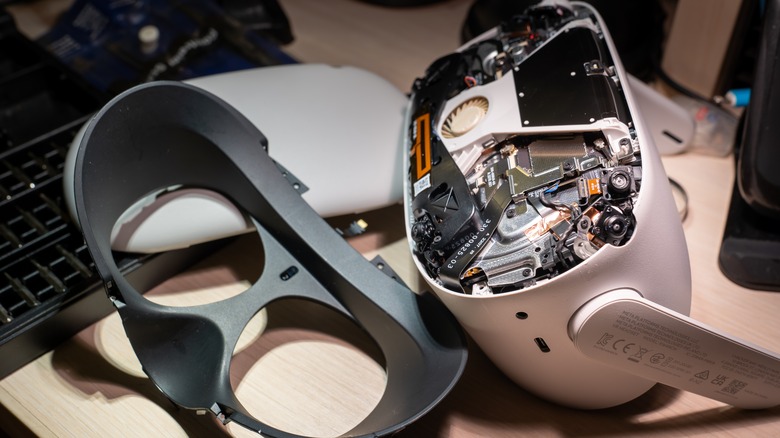Virtual Reality Is Doomed If Meta Doesn't Change
Meta is the company that brought VR to the masses. Its staggeringly cheap — yet in many ways, cutting-edge – Quest 2 headset gave millions of people access to a platform that was previously an expensive niche. That isn't enough for Mark Zuckerberg's company. He soon envisions a world where we'll use VR to play, work, and hang out with friends. In order to achieve his vision, Zuckerberg has pumped billions into Reality Labs, Meta's VR department. He has also, for the most part, kept the faith despite protests from shareholders who are likely staring slack-jawed at the staggering losses Meta's VR ventures are making.
But as someone who is immensely passionate about VR, I'm just as shocked as the shareholders. I believe the concept is worth sinking money into, but some of Meta's decision-making has been absolutely awful in recent years. Some of those decisions have been bad for the company, while others are damaging the viability of VR in general. Worse yet, given Meta's share of the market and its importance to the VR industry as a whole, there's a danger that Zuckerberg bowing out could kill the concept entirely.
Zuckerberg is focusing on the wrong audience
If you look at the staggering amount of money Reality Labs is losing, then you'd be forgiven for thinking VR is a bit of a lame duck. But VR as a concept isn't the problem, Meta's overall strategy is — and VR isn't the money pit Meta is making it out to be. The gaming side of things is immensely profitable, with many VR titles netting their creators millions of dollars in sales. The VR gaming audience is pretty dedicated too, with many using the Quest as a gateway drug before going on to splash the cash on PCVR setups, full body tracking, and other ways to enhance their experiences.
Meta is taking this audience for granted. I would argue that the main reason the Quest Pro sold so poorly was down to the fact it was targeted at businesses and enterprise users rather than VR gamers. Accessories like the full light blocker weren't included, and are instead only available as pricy add-ons. Features like Wi-Fi 6e compatibility still haven't been enabled. The people left disappointed by the Quest Pro are the exact early adopters Meta needs to be focusing on if it wants the Quest to remain the go-to headset for many VR users.
Equally, the "Metaverse" seems like a wide-ranging waste of time. Many elements of it already exist, but Meta is wasting a fortune pushing VR in directions it really doesn't need to go in an attempt to create an all-encompassing evolution of the world wide web. Instead of creating an entirely new universe, it should instead focus on polishing the user experiences already on offer — because those are mostly terrible.
Meta's acquisitions have hurt the industry as a whole
A key part of Meta's business strategy has involved acquiring any moderately promising and successful indie VR developer. The VR division itself owes most of its existence to Facebook's purchase of Oculus — which itself was a pioneer of this current VR generation. Notable companies now owned by Mark Zuckerberg's corporation include Armature Studio, which developed "Resident Evil VR," Beat Games, which gave us "Beat Saber," and Ready at Dawn, which produced the "Lone Echo" series.
While this is probably a sound business strategy on Meta's part, it hurts the industry as a whole for two reasons. Firstly, if Meta owns the companies with the biggest VR intellectual properties, it can make those games exclusives. This is bad news for potential competitors like HTC, as users of its headsets might miss out on the best games. This stifles competition, and a lack of competition is bad for the industry.
Worse still is Meta's refusal to let those studios do their thing. Many of the studios that were brought under Meta's umbrella have produced absolutely nothing of note since they were taken over. This in turn might have robbed the VR community of a lot of content. If Meta is wondering why Quest 2s are ending up on shelves, maybe it should look at its own lack of output.
If Meta doesn't change tack, VR could be another failed idea
VR isn't a new concept, but this is probably the best spot it's ever been in. We have several wearable, wireless headsets on the market. Games can look great and be deeply immersive. The internet means it's possible to interact with people around the world, and uptake is also promising. But Meta has a chance of messing all of this up.
Despite Apple, Valve, and Samsung being amongst the huge companies dabbling in virtual and mixed reality, Meta is without a doubt the king of the VR mountain. It has the highest number of users, most ambitious plans, and may have invested the most money into VR. But as recent layoffs have shown, shareholders aren't too happy with multi-billion dollar losses quarter after quarter. If the "Metaverse" concept tanks one of the biggest companies on Earth, or even brings Meta to the point where Zuckerberg is ousted, and its Reality Labs projects are shelved, then that could be it for this generation of VR projects.
How can this be avoided? Meta needs to reassess and put more focus on the gaming side of things. Creatives and businesses aren't going for VR in a big way; even Meta's own staff are avoiding the Metaverse. So take the easy money, and do what you can to please an audience that is genuinely passionate about VR and really wants to see the concept taken as far as possible.



